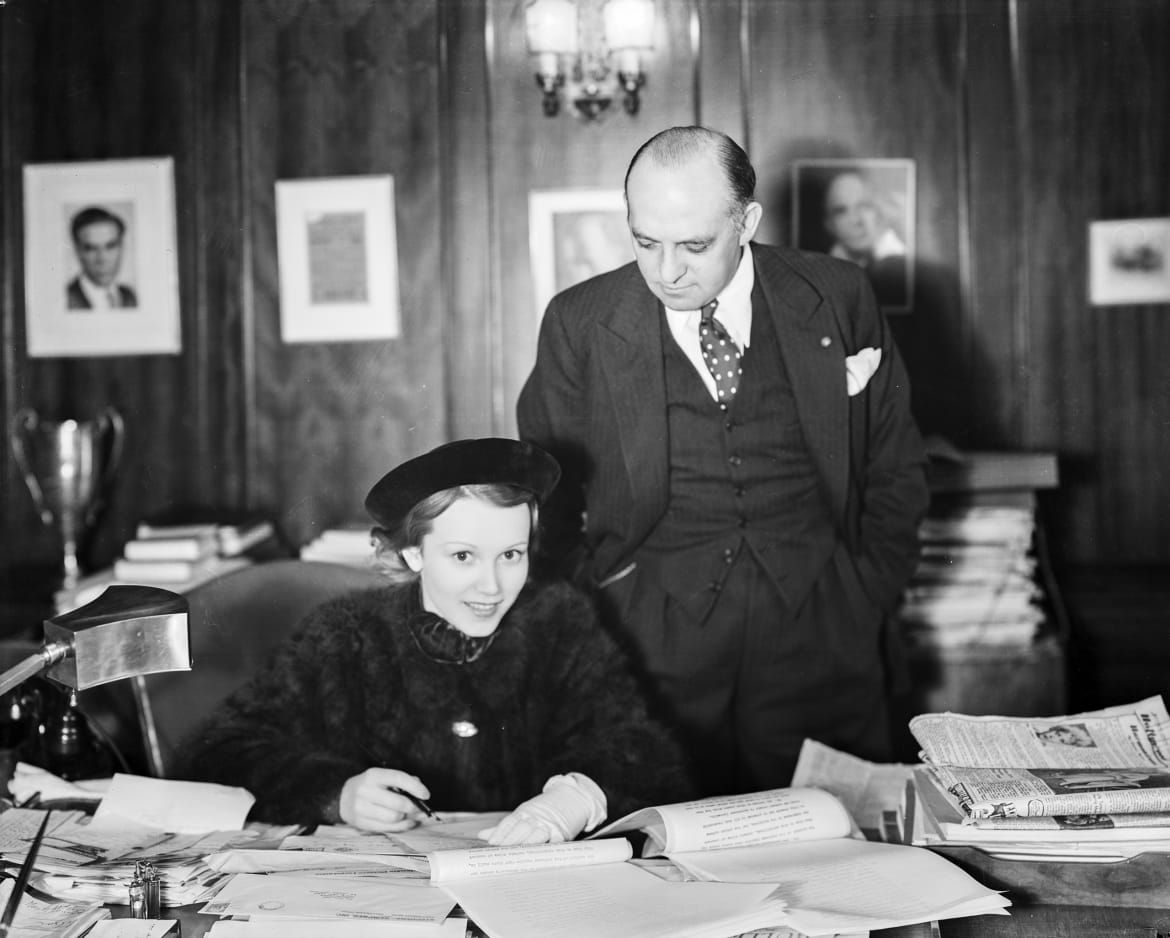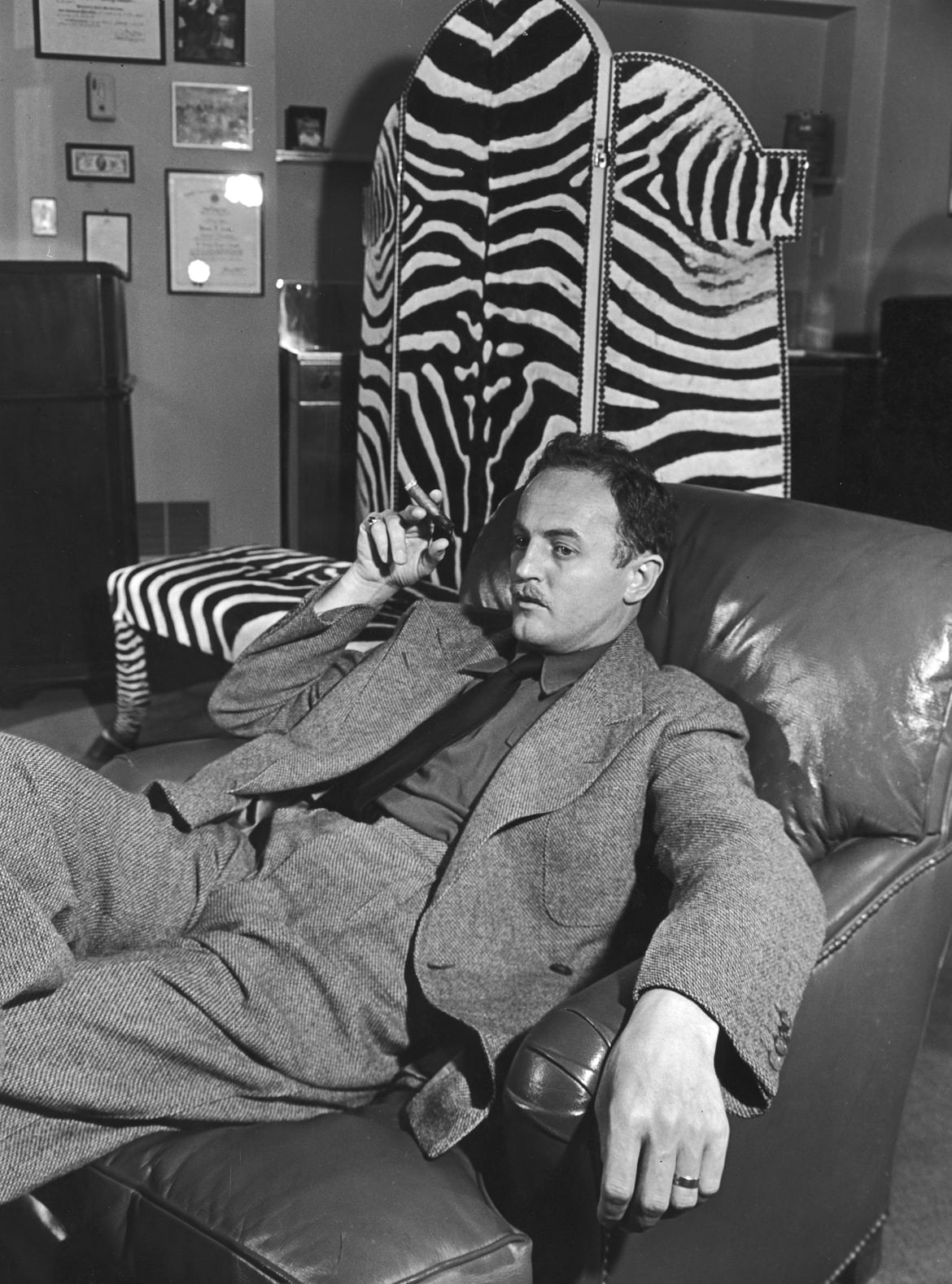The Casting Couch is as old as Hollywood and as inescapable as bad reviews.
Journalists keep blaming many different initiators of this demeaning show business “audition.” Suspects include Mack Sennett of the Keystone Comedies; Samuel Goldwyn, the G in MGM; Louis B. Mayer, the second M in MGM; Howard Hughes the studio head, aviator and germaphobic billionaire;Jack Warner of Warner Brothers; and Benny Thau, the MGM casting whiz whose casting couch, some say, “was the busiest in Hollywood.” The talent agent, Henry Willson, may have invented the gay casting couch. If victory has a thousand fathers, power and perversion do too.
All these powerful men had many affairs with young ambitious hotties hoping to become movie stars. The most frequently mentioned of these pioneering phallocrats in the movie business, however, are Harry Cohn and Darryl Zanuck. Their stories are typical – and reveal the sick mix of sex and power obscured in a haze of all-American hypocrisy that explain the rise of the entertainment industry’s perverse, pervasive rite of passage.
Harry Cohn, the founder of Columbia Pictures Corporation, was part of the Eastern European Jewish mogulocracy that came from nowhere and invented Hollywood. Born to poor immigrant Jews in New York City in 1891, by 1919 he was in “the business.” Cohn was a tyrant. His temper was his chosen tool for getting his way. Listening devices throughout his studio helped him eavesdrop on subordinates – and a sound system allowed him to blast anyone who annoyed him. He was so unpleasant that the comedian Red Skelton, noting how crowded his funeral was in 1958, quipped: “It proves what Harry always said: give the public what they want – and they’ll come out for it.”

JOHN KOBAL FOUNDATION/GETTY
JKF480
Producer Harry Cohn, President of Columbia Pictures, watching an actress sign a contract in his office, 1935.
Cohn gave the public what they wanted – yet helped elevate their tastes too. Films like Frank Capra’s It Happened One Night and Mr. Smith Goes to Washington entertained and enlightened. All the King’s Men remains a brilliant look at American political crudeness and demagoguery.
Alas, “King Cohn” treated women as his subjects too. His office was all white, with white chairs, a white piano, and a white sofa that one biographer deemed “the original ‘casting couch.’” Throughout the Great Depression and World War II, Cohn filled his shelves with silk stockings and expensive perfumes. Women knew what they had to do to earn these gifts.
Most who succumbed – or seduced — didn’t kiss and tell. Marilyn Monroe – who admitted to sleeping with many producers – apparently drew the line with Cohn. Cohn invited her to a cruise on his yacht and demanded she strip for him. When she rebuffed his advances, she later reported: “I had never seen a man so angry.”
Darryl Zanuck was equally crude – and talented. Born in Wahoo, Nebraska, Zanuck started writing for the popular Warner Bros. Rin Tin Tin serial. He eventually formed 20th Century Pictures, Inc. which by 1935, became Twentieth Century-Fox Film Corporation. Ashamed that he wrote and produced the slapstick, racist comedy, Ham and Eggs at the Front in 1927, Zanuck became even more determined than Cohn to use the movies to fight injustice. A non-Jew who grumbled that not being Jewish prevented him from rising at Warner Bros, he hired the talented director Elia Kazan to direct Gentlemen’s Agreement in 1947. The movie, starring Gregory Peck as a Gentile reporter who goes undercover as a Jew, was the first Hollywood expose of anti-Semitism. He also fought racism in Pinky (1949); poverty in The Grapes of Wrath (1940); and prejudice against the mentally ill in The Snake Pit (1949).

MARGARET BOURKE-WHITE/THE LIFE PICTURE COLLECTION/GETTY
00730785.jpg
Studio head Darryl F. Zanuck relaxing with cigar in front of screen made from skin of a zebra he shot in Africa in his office at 20th Century Fox.
Yet Zanuck, too, was a pig. He humiliated his wife Virginia Fox by going to Europe in 1956 and shacking up with three untalented but fetching French mistresses in a row. Long before those episodes, he flamboyantly announced he was “in conference” daily between 4 and 4:30 pm with aspiring actresses. Sometimes he greeted them half naked – with his upper half clothed. Sometimes he showed off, what one biographer called “a life-size mold of his private parts in solid gold.” “Impressive, huh?” he once told a potential conquest. The formidable Joan Crawford sneered: “I’ve seen bigger things crawl out of cabbages.”
Crawford knew too many “casting couch cougars.” Moreover, when she was still using her childhood nickname Billie, she starred in a soft-core film with a predictable plot, Casting Couch. Most biographers believe she and MGM sought and destroyed whatever copies of this silent movie from before 1923 they could find. She also may have had to pay off a blackmailer $100,000 to hush him up about it.
Around this time, “bimbo,” Italian for young man, started applying to women – as a slur. Hollywood wags joked that the term was an acronym for “body immaculate, brains optional.”
This shift tells the story about sex in that city of make-believe. Hollywood was never just peddling stories, it was always selling sex.
The legendary director Elia Kazanexplained that studio heads “thought of every film they made, no matter how serious a theme, as a love story.” As a result, he admits cleverly but crudely, “They went by a simple rule and a useful one: Do I want to fuck her?” Kazan justified that disgusting calculus, explaining: “The audience must be interested in the film’s people in this elemental way…. If the producer wasn’t interested in an actress this way, he was convinced an audience wouldn’t be.”
This sexual mixed messaging intersects with the crass power dynamics that turned a third-rate, California city into America’s culture capital. The men who made America’s capital of make-believe were brilliant businessmen, master manipulators, and performance artists. Most tempered their Harry Cohn-like bullying with an impish humor. The combination masked their insecurities: be it as immigrants or children of immigrants, as Jews, as investors of big money in a fly-by-night business dependent on a fickle public.
They were all hucksters. Samuel Goldwyn, born as Szmuel Gelbfisz in Warsaw, Poland, turned his awkward English into funny “Goldwynisms,”malapropisms: “You are partly one hundred percent right” and – something quite true: “If I were in this business only for the business, I wouldn’t be in this business.” Jack Warner – whose family name probably was “Wonsal” or “Wonskolaser” met Albert Einstein and said, “I have a theory of relatives, too: Don’t hire ’em.” In his autobiography, Warner explained the game: ”As a little boy I started building up layers of insulation, and now I have the hide of an elephant.”
Of course, the land of make believe masked all these sexual antics and power games. In the olden days, they hid their whoring behind a Madonna veneer, preaching virtue and virginity. Today, in the age of Madonna, many hide their assault on traditional anchors behind a veneer of political correctness (see Weinstein, Harvey). Increasingly, it feels like the American way; in fact, this unnerving mix of wild ways and self-righteous posturing has helped America lose its way.